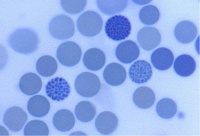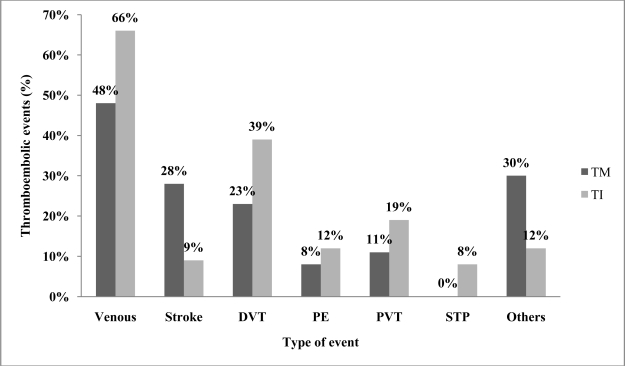Talk:2011 Group Project 1: Difference between revisions
No edit summary |
No edit summary |
||
| Line 53: | Line 53: | ||
== Images == | == Images == | ||
I found a pic of what the cells look like under a microscope. | |||
[[File:Thala.jpg|200px|thumb|left|alt text]] | |||
--[[User:Z3060621|Aisyah Barchia]] 19:19, 17 August 2011 (EST) | |||
[[File:ThromboembolicEvents.jpg |Thromboembolic Events In Thalassemia Intermedia (TI) VS Thalassemia Major (TM)|framed|left]] | [[File:ThromboembolicEvents.jpg |Thromboembolic Events In Thalassemia Intermedia (TI) VS Thalassemia Major (TM)|framed|left]] | ||
Revision as of 19:19, 17 August 2011
Group 1: User:z3060621 | User:z3217043 | User:z3217345 | User:z3391078
So I guess we are doing Turner's Syndrome? Or are we still discussing?
I think Thalassemia sounds really interesting and there is more scope for research/ learning something new rather than the sex chromosome abnormalities.
Here are two articles which were interesting I found:
A rapid detection for α-thalassemia by PCR combined with dissociation curve analysis
Hematopoietic stem cell transplantation in thalassemia
--z3217043 20:24, 10 August 2011 (EST)
Thalassemia
--z3217345 13:44, 10 August 2011 (EST)
Discussion
There a number of research and review articles, particularly on PubMed, so maybe post ones that you find interesting up and then we can maybe assign sections to everyone next lab so that we can further research those particular areas individually?--z3217345 13:55, 10 August 2011 (EST)
I had found two of the same articles that had already been posted, so I had to go back and find different ones. I'm not sure if we really are going to do Turner's Sydrome since not all of us were present when we named it. We can decide in class tomorrow I guess. --Z3391078 02:23, 11 August 2011 (EST)
Research Articles
Turner syndrome and metabolic derangements: Another example of fetal programming.--z3217345 13:44, 10 August 2011 (EST) (Prior topic)
Turner syndrome and sexual differentiation of the brain: implications for understanding male-biased neurodevelopmental disorders. --z3217345 13:44, 10 August 2011 (EST)(Prior topic)
Estrogen requirements in girls with Turner syndrome; how low is enough for initiating puberty and uterine development?--z3217345 13:44, 10 August 2011 (EST)(Prior topic)
Outcomes of spontaneous and assisted pregnancies in Turner syndrome: the U.S. National Institutes of Health experience. --Z3391078 02:18, 11 August 2011 (EST)
How I treat thalassemia--z3217345 11:45, 11 August 2011 (EST)
Pulmonary function in thalassaemia major and its correlation with body iron stores--z3217345 11:45, 11 August 2011 (EST)
Review Articles
Optimising management in Turner syndrome: from infancy to adult transfer.--z3217345 13:44, 10 August 2011 (EST)(Prior topic)
Turner Syndrome --Z3391078 02:31, 11 August 2011 (EST)
Beta-thalassemia--z3217345 11:45, 11 August 2011 (EST)
Images
I found a pic of what the cells look like under a microscope.
--Aisyah Barchia 19:19, 17 August 2011 (EST)
Nothing going on here guys? There should be some discussion within your group on the possible topic. --Mark Hill 23:53, 7 August 2011 (EST)
Plagiarism
--Mark Hill 07:35, 30 September 2011 (EST) Currently all students originally assigned to each group are listed as equal authors/contributors to their project. If you have not contributed the content you had originally agreed to, nor participated in the group work process, then you should contact the course coordinator immediately and either discuss your contribution or request removal from the group author list. Remember that all student online contributions are recorded by date, time and the actual contributed content. A similar email reminder will be sent to all current students.
Please note the Universities Policy regarding Plagiarism
In particular this example:
- "Claiming credit for a proportion of work contributed to a group assessment item that is greater than that actually contributed;"
Academic Misconduct carries penalties. If a student is found guilty of academic misconduct, the penalties include warnings, remedial educative action, being failed in an assignment or excluded from the University for two years.
2011 Projects: Turner Syndrome | DiGeorge Syndrome | Klinefelter's Syndrome | Huntington's Disease | Fragile X Syndrome | Tetralogy of Fallot | Angelman Syndrome | Friedreich's Ataxia | Williams-Beuren Syndrome | Duchenne Muscular Dystrolphy | Cleft Palate and Lip

